|
TRANSLATE THIS ARTICLE
Integral World: Exploring Theories of Everything
An independent forum for a critical discussion of the integral philosophy of Ken Wilber
 David Christopher Lane, Ph.D.
Professor of Philosophy, Mt. San Antonio College Lecturer in Religious Studies, California State University, Long Beach Author of Exposing Cults: When the Skeptical Mind Confronts the Mystical (New York and London: Garland Publishers, 1994) and The Radhasoami Tradition: A Critical History of Guru Succession (New York and London: Garland Publishers, 1992). David Christopher Lane, Ph.D.
Professor of Philosophy, Mt. San Antonio College Lecturer in Religious Studies, California State University, Long Beach Author of Exposing Cults: When the Skeptical Mind Confronts the Mystical (New York and London: Garland Publishers, 1994) and The Radhasoami Tradition: A Critical History of Guru Succession (New York and London: Garland Publishers, 1992).
DOUBTING MIND
Great Skeptical Thinkers
Susan Blackmore |
Brian Cox |
Martin Gardner |
Sam Harris |
Christopher Hitchens |
Harry Houdini |
Ray Hyman |
Phillip J. Klass |
Joe Nickell |
James Randi |
Adam Savage |
Eugenie Scott
EUGENIE SCOTTJenny WangEugenie Carol Scott was born on October 24, 1945. She is an American physical anthropologist, a former university professor, and an educator who has been a critic of Earth creationism and intelligent design. Since 1986, Scott served as the Executive Director of the National Center for Science Education (ECSE) for 28 years, a nonprofit science education organization supporting teaching of evolutionary science. Since 2013, Scott has been listed on their Advisory Council. 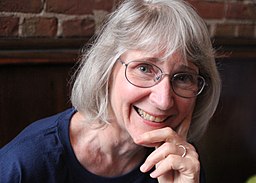 Eugenie Carol Scott Scott earned her Ph.D. in biological anthropology at the University of Missouri. Most of her research has been in human medical anthropology and skeletal biology. Scott has devoted herself to science for nearly her whole life. Scott not only is a member of the Board of Advisers for the publication, Scientific American, but also a fellow of the Committee for Skeptical Inquiry (CSI) and GWUP- Gesellschaft zur wissenschaftlichen Untersuchung von Parawissenschaften (German) [English translation: Society for the Scientific Investigation of Parasciences], a non-profit organization that uphold scientific skepticism. Moreover, she serves on the Board of Trustees of Americans United for Separation of Church and State, a nonprofit organization that advocates the separation of church and state, and which holds as its motto "Congress shall make no law respecting an establishment of religion, or prohibiting the free exercise thereof." Scott was born and raised in Wisconsin. Her interest in anthropology was initiated after reading her sister's anthropology textbook. Scott received both Bachelor and Master's degrees from the University of Wisconsin-Milwaukee. Then, she pursued her Ph.D. from the University of Missouri. Later on, in 1974, she joined the University of Kentucky as a professor of physical anthropology; that's when her journey to the front lines of the evolution wars began. When her mentor James Gavan, a physical anthropologist at the University of Missouri, accepted an invitation to debate Duane Gish, a biochemist and a leader in the creationist movement, her passion for the creation-evolution controversy was sparked. At the time, Scott was a newly minted professor of physical anthropology at the University of Kentucky. In the debate, Scott expressed her opinion, “The scientist talked science, and the creationist connected to the audience and told good jokes and was really personable. And presented a lot of really bad science.” She then concluded that creationism is “a movement that could have really serious consequences for science and science education.” Aside from being a professor in University of Kentucky, she also taught at the University of Colorado and California State University, Hayward. In 1980, Scott worked to thwart creationism from being taught in the public schools of Lexington, Kentucky. She objected to the idea of allowing creationism in education— the idea that the universe was designed as it is by a supernatural power — or its ideological cousin, “intelligent design”. She mobilized scientists, educators, lay people, religious groups, skeptics, agnostics, believers, scholars and ordinary citizens to advance the cause of science. Soon after, Scott was nominated as the executive director of the National Center for Science Education in 1987, the same year in which the teaching of creation science in American public schools was deemed illegal and no longer a requirement by the Supreme Court in Edwards v. Aguillard. Scott was brought up with Christian beliefs by her mother and grandmother and later she started attending a congregational church under the influence of her sister. She described her background as liberal Protestant. Now, Scott is a secular humanist and describes herself as a non-theist. In 2003, the San Francisco Chronicle reported that, "Scott describes herself as atheist but does not discount the importance of spirituality." In 2003 she was one of the signatories to the third humanist manifesto, Humanism and Its Aspirations. Dr. Scott's first well-known book is called Evolution vs. Creationism: An Introduction and was published by Greenwood Press in 2004 and then in paperback by the University of California Press in 2005. She co-edited with Glenn Branch the 2006 anthology, Not in Our Classrooms: Why Intelligent Design is Wrong for Our Schools. In 2006, Dr. Scott, Jon D. Miller, and Shinji Okamoto had a brief article published in Science entitled "Public Acceptance of Evolution", an analysis of surveys on the acceptance of evolution from the last 20 years in the United States in comparison with other countries. The result displayed Turkey had the lowest acceptance of evolution, and the United States came in as the second lowest. Even though the result was slightly disappointing, the authors saw a positive sign in that a high percentage of Americans are “unsure” about evolution, therefore there is still a level of improvement on reaching those on the fence concerning the theory of evolution. In conclusion, Dr. Eugenie C. Scott is a major spokesperson against the teaching of creationism as a science and for promoting the evidential basis for the theory of evolution. She has been described as “someone who is often sent out to defend Darwin,” and refers to herself as “Darwin's golden retriever”. Scott has been profiled in several newspapers and magazines: The New York Times, Scientific American, The Scientist, the San Francisco Chronicle, and the Stanford Medical Magazine. She has won several awards such as The Stephen J Gould Prize awarded by the Society for the Study of Evolution, and The Fellows Medal, the highest honor awarded by the California Academy of Sciences—both in 2009. In 2010, The Public Welfare Medal by the U.S. National Academy of Sciences. In 2012, The Richard Dawkins Award, presented by the Atheist Alliance of America "to individuals it judges to have raised the public consciousness of atheism". In 2018, The Pojeta Award, the exceptional professional individual from the Paleontological Society. In 2019, Dr. Scott was invited as an honorable fellow for the German Skeptic group Gesellschaft zur wissenschaftlichen Untersuchung von Parawissenschaften (GWUP). Further Reading1. Evolution vs. Creationism: An Introduction, University of California Press; Second edition (August 3, 2009) 2. Not in Our Classrooms: Why Intelligent Design Is Wrong for Our Schools, Beacon Press; 1 edition (October 15, 2006) 3. Berkeley Talks transcript: Anthropologist Eugenie Scott on evolution and creationism as science and myth, October 4, 2018 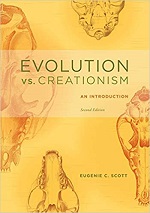 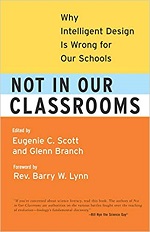 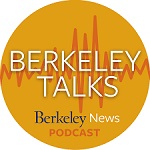 PREFACE | David Christopher Lane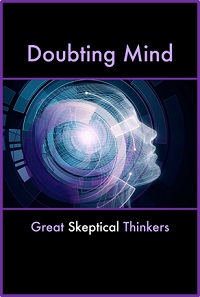
Before the current pandemic altered our day to day lives, the MSAC Philosophy Group had been working on a book entitled, Doubting Mind: Great Skeptical Thinkers, which contained separate essays on a number of notable researchers who champion critical thinking and skepticism when analyzing paranormal claims, such as UFOs, astrology, and various religious claims. The book has now been finished, though it took a bit longer than we anticipated. The word skeptical has too often been conflated with the word cynical. The former term comes from the Greek word skepsis which properly defined means "to look, view, observe." Or, as Miguel de Unamuno explained in 1924 in his book, Essays and Soliloquies, "Skeptic does not mean him who doubts, but him who investigates or researches as opposed to him who asserts and thinks that he has found." To be cynical, on the other hand, indicates that the person is "[pre] disposed to disbelieve or doubt the sincerity or value of social usages or personal character or motives and to express it by sarcasm and sneers, disparaging of the motives of others, captious, peevish." Therefore, it is important to understand that a skeptic is not one who ad hoc dismisses borderland ideas, but is one who is willing to go the extra mile to gather more (not less) information about any given phenomenon. As I have often remarked (to the obvious consternation of certain cult followers), we, humans, are too gullible when we accept miraculous claims without further investigation. We are cheap sluts for the paranormal, believing too easily in conspiracy theories that defy the known law of physics. There are many reasons why this is so, but I suspect that in a world where everything eventually eats one another to survive (whether it be a vegan eating plants or a carnivore eating meat), any organism that can develop a buffering illusion to survive such a horror show has an evolutionary advantage over others that cannot. This came into sharper relief for me this past week as I watching the British made television mini-series, War of the Worlds, where in one particularly poignant scene a mother who has just witnessed the death of her children at the hands of an alien species realizes that there is no point in continuing to live in such a horrific environment. She opts to shoot herself and the viewer instead of being shocked perfectly sympathizes with her decision. Nature is a madhouse if looked at objectively and therefore it is not surprising that we have evolved all sorts of mental defense systems in order to live long enough on terra firma to pass on our genetic heritage. Since we are the survivors in this boiling cauldron of eat or be eaten, we have inherited a variety of tools to ward off the true existential dread that can overcome any being that becomes too keenly aware of how this DNA game plays out. I mention all this as a necessary preface, since no matter how well versed we may become in science (and trained to become good doubters, in the positive sense of that term), we still retain at the core of our beings a deeply emotional component that defies a purely rational or logical way of being. We may act like scientists from time to time, but we are not scientists in the long term. We are vulnerable creatures and our myths and our fairy tales will persist even if we opt for agnosticism or atheism, though they may take on a different color and hue and justifications. Thus, this book provides us with but a small glimpse of how to think more rationally and critically, despite the sobering realization that we cannot be great skeptics all the time.
Comment Form is loading comments...
|